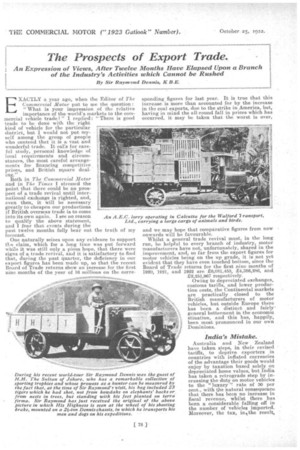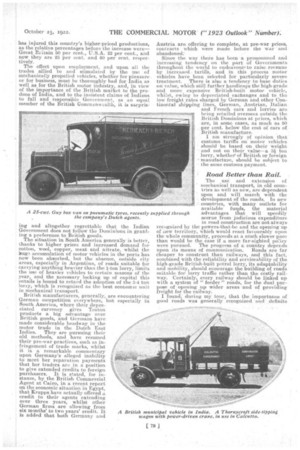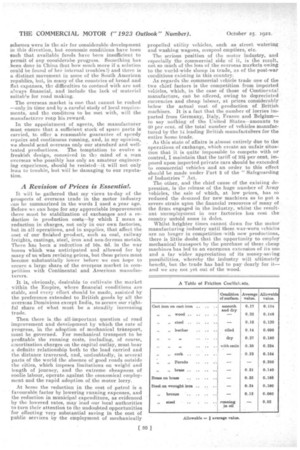The Prospects of Export Trade.
Page 8

Page 9

Page 10

If you've noticed an error in this article please click here to report it so we can fix it.
An Expression of Views, After Twelve Months Have Elapsed Upon a Branch of the Industry's Activities which Cannot be Rushed
By Sir Raymond Dennis, K B.E.
IFa XACTLY a year ago, when the Editor of The Commercial Motor put to me the question : "What is your impression of the relative importance of the world's markets to the commercial vehicle trade? " I replied: " There is good trade to be done with the right kind of vehicle for the particular district, but I would not put myself among the group of people who contend. that it is a vast and wonderful trade. It calls for careful study, personal knowledge of local requirements and circumstances, the most careful arrangements for financing competitive prices, and British square dealing."
Both in The Commercial Motor and in The Times I stressed the point that there could be no prospect of a trade revival until international exchange is righted, and, even then, it will be necessary greatly to cheapen our productions if British overseas trade is to come into its own again. I see no reason to qualify the above statement, and I fear that events during the . past twelve months fully bear out the truth forecast.
One naturally seizes upon any evidence to support fte. claim, which for a long time was put forward while it was still only a pious hope, that there were signs of a trade revival, and it is satisfactory to find that, during the past quarter, the deficiency in our export figures has been made up, so that the recent Board of Trade returns show an increase for the first nine months of the year of 16 millions on the corre
of my sponding figures for last year. It is true that this increase is more than accounted for by the increase in the coal exports, due to the strike in America, but, having in mind the all-round fall in prices which has occurred, it may be taken that the worst is over, and we may hope that comparative figures from now onwards will be favourable.
Whilst a general trade revival must, in the long run, be helpful to every branch of industry, motor manufacturers have not, unfortunately, shared in the improvement, and, so far from the export figures for motor vehicles being on the up grade, it is not yet evident that they have even touched bottom, since the Board of Trade returns for the first nine months of 1920, 1921, and 1922 are £6,081,453, 24,386,286, and 22,251,967 respectively.
Owing to depreciated exchanges, customs tariffs, and lower production costs, the Continental markets are practically closed to the British manufacturers of motor vehicles, but outside Europe there has been a distinct and fairly' general betterment in the economic stivation, and this has, happily, been most pronounced in our own Dominions.
India's Mistake.
Australia and New Zealand have taken steps, in their revised tariffs, to deprive exporters in countries with inflated currencies of the advantage their goods would enjoy by taxation based solely on depreciated home values, but India has taken a retrograde step by increasing the duty on motor vehicles to the "luxury " rate of 30 per cent., with the natural consequence that there has been no increase in fiscal revenue, whilst there has been a considerable falling off in the number of vehicles imported. Moreover, the tax, inithe result,
has injured this country's higher-priced productions, as the relative percentages before the increase were— Great Brilain 50 per cent., U.S.A. 22 per cent., and now they are 25 per cent. and 60 per cent. respectively.
The effect upon employment, and upon all the trades allied to and stimulated by the use of mechanically propelled vehicles, whether for pleasure or for business, must be thoroughly bad for India as well as for the British motor industry, and, in view of the importance of the British market to the produce of India, and to the insistent claims of Indians to full and responsible Government, as an equal member of the British Gommonwaalth, it is sarpria ing and altogether regrettable that the Indian Government does not follow the Dominions in granting a preference to British goods. The situation in South America generally is better, thanks to higher prices and increased demand for cotton, wool, copper, meat and nitrate. whilst the huge accumulation of motor vehicles in the ports has now been absorbed, but the absence, Outside city areas especially in Argentina, of roads suitable for carrying anything heavier than the 1-ton lorry, limits the use of heavier vehicles to certain seasons of the year, and the necessary locking up of capital this entails is hound to retard the adoption of the 3-4 ton lorry, which is recognized as the best economic unit in mechanical transport.
British manufacturers, generally, are encountering German competition everywhere, but especially in South America, where their depreciated currency gives Teuten products a big advantage over British goods, and Germans have made considerable headway in the motor trade in the Dutch East Indies. They are pursuing their old methods, and have resumed their pre-war practices, such as infringement of trade marks, whilst it is a remarkable commentary upon Germany's alleged inability to meet her reparation payments that her traders are in a position to give extended credits to foreign purchasers. It is stated, for instance, by the British Commercial Agent at Cairo, in a recent report on the economic situation in Egypt, that Krupps have actually offered a credit to their agents extending over three years, whilst other German firms are allowing from six months' to two years' credit. It is added that both Germany and
Austria are offering to complete, at pre-war prices, contracts which were made before the war • and abandoned: Since the war there has been a pronounced and increasing tendency on the part of Governments throughout the world to endeavomo.to raise: revenue by increased tariffs, and in this process motor vehicles have been selected for particularly severe • treatment. There is also a tendency to base duties on value, which still further handicaps the high-grade and more expensive British-built motor vehicle, whilst, owing to depreciated exchanges and to the low freight rates eharged by German and other Continental shipping lines, German, Austrian, Italian . and French cars and lorries are being retailed overseas outside the British Dominions at prices, which are, in some cases, as much as 50 per cent. below the cost of cars of British manufacture.
I am strongly of opinion that customs tariffs on motor vehicles should be based on their weight and not on their value—a 3iton lorry, whethef of British or foreign manufactuae, should be subject to •• the same customs payinent.
Road Better than Rail.
The use and extension of mechanical transport, in old countries as well as new, arc dependent upon and will march with the development cif the reads. In new countries, with many outlets for available fuqds, the material advantages that will speedily accrue from judicious expenditure in road construction are not always recognized by the powers-that-be and the opening up of new territory, which would react favourably upoe the whole community, proceeds at a niuch slower pace than would be the case if a more far-sighted po.iey were pursued. The progress of a country depends upon its means of communication. Roads are far cheaper to construct than railways, and this fact, combined with the reliability and serviceability of the high-grade British-built petrol lorry, its adaptability and mobility, should encourage the building of roads suitable for lorry traffic rather than the costly railway. Certainly, every railway should be linked up with a system of " feeder " roads, for the dual purpose of opening up wider areas and of providing freight for the railway. I found; during. my tour, that the importance of good roads was generally recognized and definite
schemes were in the air for considerable development in this direction but economic conditions have been Such that available funds have been insufficient to permit of any considerahe progress. Something has been done in China (but how much more if a solution could be found of her internal troubles?) and there is a distinct movement in some of the South American republics, but, in many of the countries of broad and flat expanses, the difficulties to contend with are not always financial, and include the lack of material suitab'e for road making.
The overseas market is one that cannot be rushed —only in time and by a careful study of local requirements, and the conditons to be met with, will the manufacturer reap his reward.
In the appointment of agents, the manufacturer must ensure that a sufficient stock of spare parts is carried, to offer a reasonable guarantee of speedy repairs and continuous running, and, in my opinion, we should send overseas only our standard and well tested productions. The temptation to evolve a freakish design, conceived in the mind of a man overseas who possibly has only an amateur engineering experience, should be resisted—it will not only lead to trouble, but will be damaging to our reputation.
A Revision of Prices is Essential.
It will be gathered that my views to-day of the prospects of overseas trade in the motor industry can be summarized in the words I used a year ago. Before we can hope for any appreciable improvement there must be stabilization of exchanges and a reduction in production costs—by which I mean a reduction in charges, not only in our own factories, but in all operations, and in supplies, that affect the cost of our finished product, such as coal, railway freights, castings, steel, iron and non-ferrous metals. There has been a reduction of 16s. 6d. in the war bonus which was anticipated and allowed for by many of us when revising prices, but these prices must become substantially lower before we can hope to secure a large share of the overseas market in competition with Continental and American manufacturers.
It is, obviously, desirable to cultivate the market . within the Empire, where financial conditions are stable, and every effort should be made, assisted by the preference extended to British goods by all the overseas Dominions except India, to secure our rightful share of what must be a steadily increasing trade.
Then there is Alio all-important question of road improvement and development by which the rate of progress, in the adoption of mechanical transport, must be governed. For mechanical transport to be profitable the running costs, including, of course, amortization charges on the capital outlay, must bear a definite relationship both to the load carried and the distance traversed, and, undoubtedly, in several parts of the world the absence of good roads outside the cities, which imposes limitations on weight and length of journey, and the extreme cheapness of coolie labour, operate against the economical employment and the rapid adoption of the motor lorry.
At home the reduction in the cost of petrol is a favourable factor by lowering ru:aning expenses, and the reduction in municipal expenditure, as evidenced by the lowered rates, may lead our local authorities to turn their attention to the undoubted opportunities for effecting very substantial saving in the cost of public services by the employment of mechanically propelled utility vehicles, such as street watering and washing wagons, cesspool emptiers,' etc.
The serious position of the motor industry, and especially the commercial side of it, is the result, not so much of the loss of the overseas markets owing to the world-wide slump in trade, as of the post-war conditions existing in this country.
As regards the commercial vehicle trade one of the two chief factors is the competition from imported vehicles, which, in the case of those of Continental manufacture, exit be offered, owing to depreciated currencies and cheap labour, at prices considerably below the actual cost of production of British
machines. It is a fact that the number of lorries imported from Germany, Italy, France, and Belgium—
to say nothing of the United States—amounts to 60 per cent. of the total number of vehicles manufactured by the 14 leading British manufaetulers for the entire home trade.
. As this state of affairs is almost entirely due to the operations of exchange, which create an unfair situa tion that it is quite impossible to compete with or
control, I maintain that the tariff of 33A per cent. imposed upon imported private cars should be extended
to commercial vehicles and an order to this effect should be made under Part 2 of the " Safeguarding of Industries " Act.
The other, and the chief cause of the existing depression, is the release of the huge number of Army vehicles, the sale of which, at low prices, has so reduced the demand for new machines as to put a severe strain upon the financial resources of may of the firms engaged in the industry, whilst the resultant unemployment in our factories has cost the country untold sums in doles.
Whilst brighter times cannot dawn for the motor manufacturing industry until these war-worn vehicles are no longer in competition-with new productions, there is little doubt that the opportunity to employ mechanical transport by the purchase of these cheap machines has led to an enormous extension of its use and a far wider appreciation of its money-saving possibilities, whereby the industry will ultimately benefit, but the trade has had to pay dearly for it— and we are not yet out of the wood.






















































